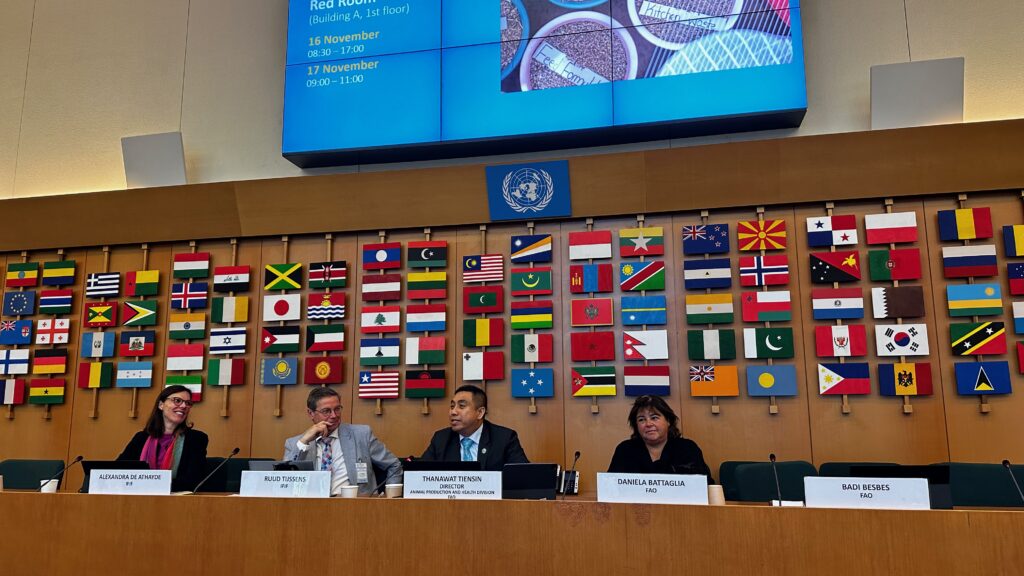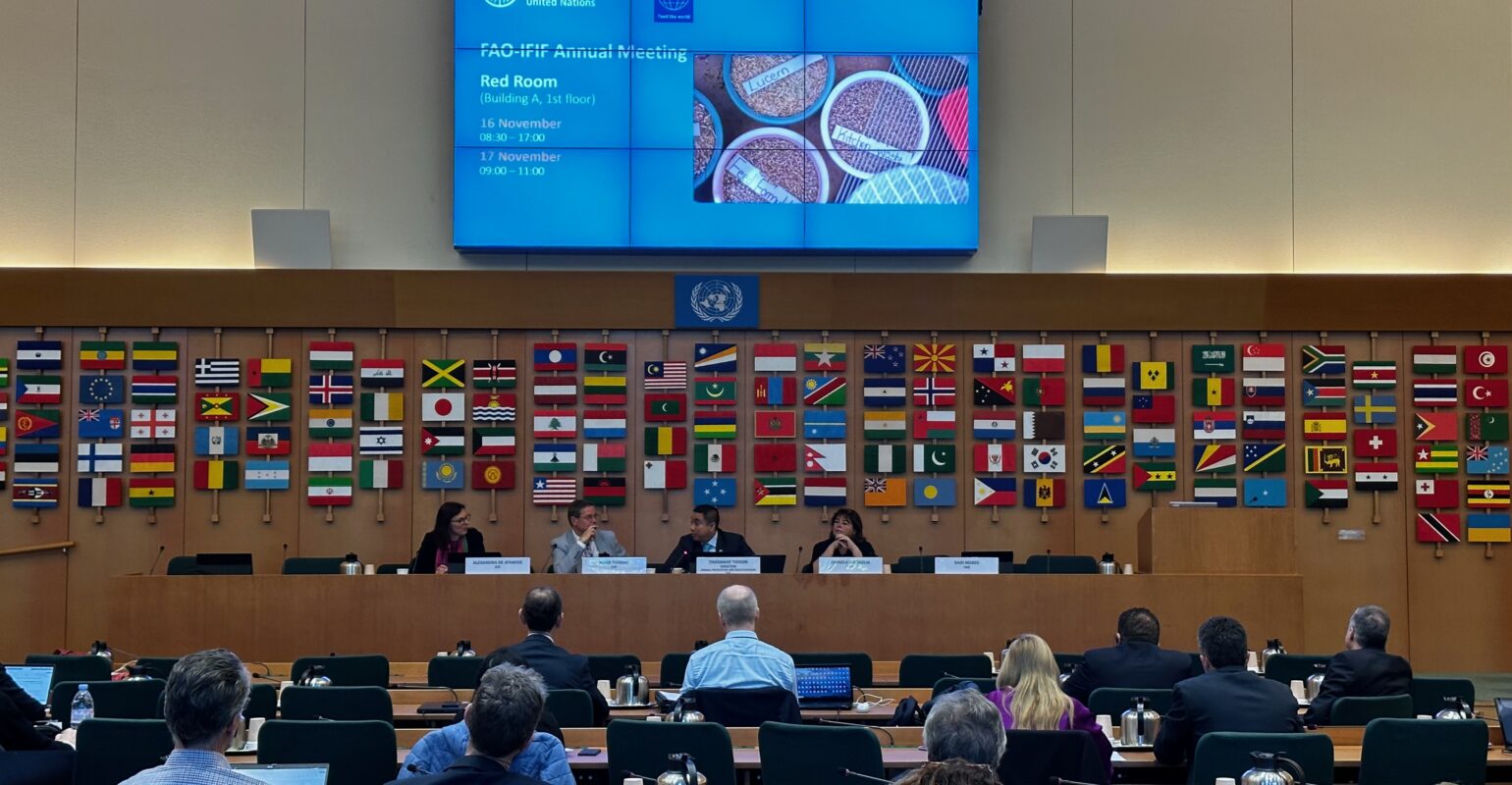Rome, Italy – The International Feed Industry Federation (IFIF) and the Food and Agriculture Organization of the United Nations (FAO) held their 22nd annual meeting to further strengthen their collaboration on critical issues to ensure safe, nutritious and sustainable feed and food.
The meeting was officially opened by Mr. Thanawat Tiensin, Director Animal Production and Health at FAO, together with Mr. Ruud Tijssens, IFIF Chairman. They welcomed the IFIF delegates representing over 80% of global compound feed production and reiterated their commitment to this longstanding partnership and agreed to continue to strengthen their work together to tackle the challenges facing the feed and food chain.
Mr. Tiensin reaffirmed the importance of “collaboration between the public and private sector, as well as other stakeholders, to support evidence-based key role of the feed and livestock sector in sustainable livestock transformation. Mr. Tiensin reiterated that livestock production is a vital part of our agrifood systems, providing essential nutrients for all and enhanced livelihoods and economic opportunities for billions of people around the world.”
Mr. Tiensin highlighted that “FAO advocates improving efficiency is essential to producing more with less. Animal Feed is a vital part of this, as efficiency can be pursued by optimizing feed conversion, reducing feed loss and waste and enhancing nutrient utilization, all of which can reduce pressure on biodiversity and land and water resources, as well as decrease greenhouse gas emissions and mitigate environmental degradation.

Mr. Tiensen reaffirmed that achieving sustainable, resilient, inclusive, and efficient sustainable livestock transformation can only be achieved by working together with all stakeholders and he called on all Members of the International Feed Industry Federation to continue concrete actions to support sustainable livestock transformation.
Mr. Tijssens, IFIF Chairman, underlined that “the animal feed industry plays a crucial role in supporting sustainable livestock production by leveraging innovation and efficiency. Animal nutrition supports animal health and welfare, as well as productivity and allows farmers to produce more with less and optimize environmental resources.”
Mr. Tijssens “congratulated the FAO for their achievements over the last year, including organizing the first-ever conference on Sustainable Livestock Transformation and the first high-level Global Forum for Animal Feed and Feed regulators in Rome, directly ahead of the FAO IFIF Annual Meeting 2023. Our joint meeting with the FAO once again underlined our strong partnership as IFIF continues to support key FAO initiatives such as the Livestock Environmental Assessment and Performance (LEAP) Partnership, the Global Agenda for Sustainable Livestock and the Multi-stakeholder Partnership for Feed safety.”
Mr. Tijssens highlighted “the publication of the updated FAO and IFIF Manual on Good Practices for the Feed Sector was a key milestone as we work together on Capacity Development for feed safety. IFIF continues to contribute to FAO’s work to address antimicrobial resistance including through advancing nutritional innovation to support animal health. IFIF looks forward to the 17th International Feed Regulators Meeting (IFRM) in 2024, which is another great example of IFIF FAO collaboration positively impacting the feed and food chain. In addition, a Capacity Development training in Asia will be an important opportunity for us to further strengthen collaboration with the Asian feed sector, regulators and stakeholders.”
Mr. Tijssens added that “together with the dedicated colleagues at the FAO we contribute to building a solid science-based approach to support safe and sustainable animal nutrition to bring quality and affordable food to a growing world population, producing more with less and even better under diverse production systems. The high quality of exchanges and cooperation towards the United Nations Sustainable Development Goals (SDGs) continue to build on our achievements and together with all IFIF members I am pleased our relationship with FAO continues to strengthen year to year.”
Daniela Battaglia, Livestock Production Officer at the Animal Production and Health Division of the FAO, said “FAO and IFIF have a long standing partnership and this meeting addressed a number of critical issues of common interest, such as the need for capacity development to ensure feed safety and the importance of collaborating to tackle the containment of antimicrobial resistance (AMR). FAO is committed to work with the private sector and the feed operators and believes that they can valuably contribute to make the livestock and food sectors more responsible and sustainable and to achieve important goals such as public health, and animal health and welfare.”
About IFIF
The International Feed Industry Federation (IFIF) is made up of national and regional feed associations, feed related organizations, and corporate members from around the globe, representing over 80% of the feed production worldwide. IFIF provides provide a unified voice and leadership to represent and promote the global feed industry as an essential participant in the food chain that provides sustainable, safe, nutritious and affordable food for a growing world population. For more information on IFIF please visit www.ifif.org or contact Alexandra de Athayde, Executive Director, at info@ifif.org.
Issued by: IFIF

